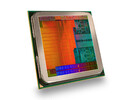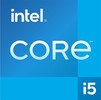AMD FX-7500 vs Intel Core i5-1250P
AMD FX-7500
► remove from comparison
The AMD FX-7500 is a power efficient ULV (Ultra Low Voltage) quad-core processor based on the Kaveri architecture. It was revealed in June 2014 for notebooks and is manufactured by GlobalFoundries using a 28 nm SHP process. In addition to having two CPU modules for a total of four integer cores clocked at 2.1 - 3.3 GHz, the AMD chip also integrates a Radeon R7 GPU clocked at up to 553 MHz with 384 GCN shaders and a dual-channel DDR3-1600 memory controller.
Architecture
Kaveri is the successor to the 2013 Richland architecture (e.g. A10-5750M). The revised CPU cores, codenamed Steamroller, represent the third generation of the module-based Bulldozer design. A number of major changes include modified decoders (now one per integer core), optimized branch prediction, and increased L1 I-cache from 64 KB to 96 KB per module. These revisions boost the performance per clock slightly over a similarly clocked Richland APU. For more details about the AMD Kaveri architecture, see our detailed analysis here:
Analysis of the AMD Kaveri Notebook Platform
Performance
According to the clock rates, the FX-7500 offers a CPU performance similar to the Haswell-based Intel Core i3-4100U. Overall, the FX-7500 is sufficient for all daily workloads (Office, Internet browsing, multimedia) as well as light multitasking.
Graphics
The Radeon R7 (Kaveri) GPU of the FX-7500 features a core clock of up to 553 MHz and 384 shader units. Since the GPU is based on AMD's GCN 1.1 architecture, both DirectX 11.2 "Tier 2" and Mantle are supported. Furthermore, the GPU can be used for general purpose computing in various applications, such as Adobe Photoshop via the OpenCL API.
In terms of 3D performance, the GPU is roughly as fast as a dedicated GeForce GT 720M and can handle many current games at low or medium settings at (W)XGA resolution.
Power Consumption
The power consumption of the entire APU is rated at 19 Watts, which is somewhat above the Haswell ULV CPUs from Intel (15 W including chipset). Nevertheless, the FX-7500 is suited for 12 - 13-inch notebooks or larger.
Intel Core i5-1250P
► remove from comparison
The Intel Core i5-1250P is a mid-range Alder Lake-P family SoC designed for use in ultra-light, ultra-thin (yet actively cooled) laptops. It was announced in early 2022 and it has 4 performance cores, as opposed to the 6 cores of the top-of-the-line i7-1280P (P-cores, Golden Cove architecture) mated to 8 efficient cores (E-cores, Gracemont architecture). The i5's P-cores are Hyper-Threading-enabled for a total of 16 threads when combined with its E-cores. The clock speeds range from 1.7 GHz to 4.4 GHz for the performance cluster and 1.2 GHz to 3.3 GHz for the efficient cluster. The shortcomings of this processor as compared with the slightly faster Core i5-1260P include the smaller L3 cache, slower iGPU model, lower clock speeds. Full vPro feature set is enabled in the case of this i5, though ("Enterprise" tier, allowing for remote device management).
Architecture
The i5 is a continuation of Intel's efforts to use the ARM-developed big.LITTLE technology for its own benefit. A single "little" Alder Lake core is supposed to be as fast as a Skylake core (as found in the venerable Core i7-6700HQ among other options) which is six years old at this point. All of Core i5-1250P's CPU cores enjoy access to 12 MB of L3 cache. The integrated memory controller supports various memory types up to LPDDR5-5200, DDR5-4800, LPDDR4x-4267 or DDR4-3200; Intel recommends using no more than 64 GB, for reference. Just like the other 12th Gen Intel Core processors, this Core i5 comes with the Thread Director which is a new functionality designed to help Windows 11 decide which cores to use for what workload for best performance and efficiency possible. Hardware acceleration of AI algorithms is supported via GNA 3.0 and DL Boost (via AVX2). The alluringly fast PCI-Express 5.0 spec has not found its way into Alder Lake P processors, so users will have to be content with PCI-Express 4.0 for the time being. Four PCI-Express 4 lanes allow for a read/write rate of up to 7.9 GB/s, provided a suitably fast NVMe SSD is used.
Please note this is not a user-replaceable CPU. It gets permanently soldered on to the motherboard (FCBGA1744 socket interface).
Performance
The average 1250P in our database nearly matches the Ryzen 5 5500U and the Ryzen 5 PRO 6650U in multi-thread performance, trailing behind the Core i5-1240P just slightly. This is a great CPU for nearly all tasks imaginable, as long as one does not expect it to be as fast as the mighty Core i7-12700H.
Your mileage may vary depending on how high the Power Limits are and how competent the cooling solution of your system is. The latter is really important as a single Golden Cove core can eat more than 20 W when under heavy load.
Graphics
The built-in graphics adapter in the form of the 80 EU Iris Xe running at up to 1.4 GHz has seen little change from what was built into certain 11th Gen Tiger Lake UP3 processors, like a Core i5-1135G7, which is hardly a downside as this iGPU is loaded with modern features, AV1 video decoding capability and SUHD 4320p monitor support included. The Xe isn't a stranger to a bit of casual gaming; that said, your mileage may vary depending on how high the Power Limits are and how capable the cooling solution of a laptop is. Expect something close to NVIDIA's MX250 or in other words, acceptable framerates in most games when playing at 1080p / Low settings. Fast RAM is a prerequisite for decent performance as the Xe has to make do with no dedicated video memory.
Power consumption
The i5's base power consumption (also known as the default TDP or Power Limit 1) is 28 W; its maximum Turbo power consumption (also known as the PL2) is not supposed to exceed 64 W. As for the "Minimum Assured" power consumption, Intel's guidelines mention 20 W. All in all, an active cooling solution is a must for a CPU like this.
The i5-1250P is built with Intel's fourth-gen 10 nm manufacturing process marketed as Intel 7 for decent, as of late 2022, energy efficiency. Despite that, the i5 is more power-hungry than certain 7 nm U-class AMD Ryzen 5000 chips delivering similar, or even higher, performance.
| Model | AMD FX-7500 | Intel Core i5-1250P | ||||||||||||||||||||||||||||||||||||||||||||||||||||||||||||||||
| Series | AMD Kaveri | Intel Alder Lake-P | ||||||||||||||||||||||||||||||||||||||||||||||||||||||||||||||||
| Codename | Kaveri | Alder Lake-P | ||||||||||||||||||||||||||||||||||||||||||||||||||||||||||||||||
| Series: Alder Lake-P Alder Lake-P |
|
| ||||||||||||||||||||||||||||||||||||||||||||||||||||||||||||||||
| Clock | 2100 - 3300 MHz | 1200 - 4400 MHz | ||||||||||||||||||||||||||||||||||||||||||||||||||||||||||||||||
| L2 Cache | 4 MB | 10 MB | ||||||||||||||||||||||||||||||||||||||||||||||||||||||||||||||||
| Cores / Threads | 4 / 4 | 12 / 16 | ||||||||||||||||||||||||||||||||||||||||||||||||||||||||||||||||
| TDP | 19 Watt | 28 Watt | ||||||||||||||||||||||||||||||||||||||||||||||||||||||||||||||||
| Transistors | 2410 Million | |||||||||||||||||||||||||||||||||||||||||||||||||||||||||||||||||
| Technology | 28 nm | 10 nm | ||||||||||||||||||||||||||||||||||||||||||||||||||||||||||||||||
| Die Size | 245 mm2 | |||||||||||||||||||||||||||||||||||||||||||||||||||||||||||||||||
| Socket | BGA (FP2) | BGA1744 | ||||||||||||||||||||||||||||||||||||||||||||||||||||||||||||||||
| Features | SSE (1, 2, 3, 3S, 4.1, 4.2, 4A), x86-64, AES, AVX, FMA, DDR3-1600 Controller | DDR4-3200/LPDDR4x-4266/DDR5-4800/LPDDR5-5200, PCIe 4, Thr. Director, DL Boost, GNA, Remote Platform Erase, MMX, SSE, SSE2, SSE3, SSSE3, SSE4.1, SSE4.2, AVX, AVX2, BMI2, ABM, FMA, ADX, SMEP, SMAP, EIST, TM1, TM2, HT, Turbo, SST, AES-NI, RDRAND, RDSEED, SHA | ||||||||||||||||||||||||||||||||||||||||||||||||||||||||||||||||
| iGPU | AMD Radeon R7 (Kaveri) (496 - 553 MHz) | Intel Iris Xe Graphics G7 80EUs ( - 1400 MHz) | ||||||||||||||||||||||||||||||||||||||||||||||||||||||||||||||||
| Architecture | x86 | x86 | ||||||||||||||||||||||||||||||||||||||||||||||||||||||||||||||||
| Announced | ||||||||||||||||||||||||||||||||||||||||||||||||||||||||||||||||||
| Manufacturer | www.amd.com | ark.intel.com | ||||||||||||||||||||||||||||||||||||||||||||||||||||||||||||||||
| L1 Cache | 1.1 MB | |||||||||||||||||||||||||||||||||||||||||||||||||||||||||||||||||
| L3 Cache | 12 MB | |||||||||||||||||||||||||||||||||||||||||||||||||||||||||||||||||
| max. Temp. | 100 °C |


 Deutsch
Deutsch English
English Español
Español Français
Français Italiano
Italiano Nederlands
Nederlands Polski
Polski Português
Português Русский
Русский Türkçe
Türkçe Svenska
Svenska Chinese
Chinese Magyar
Magyar